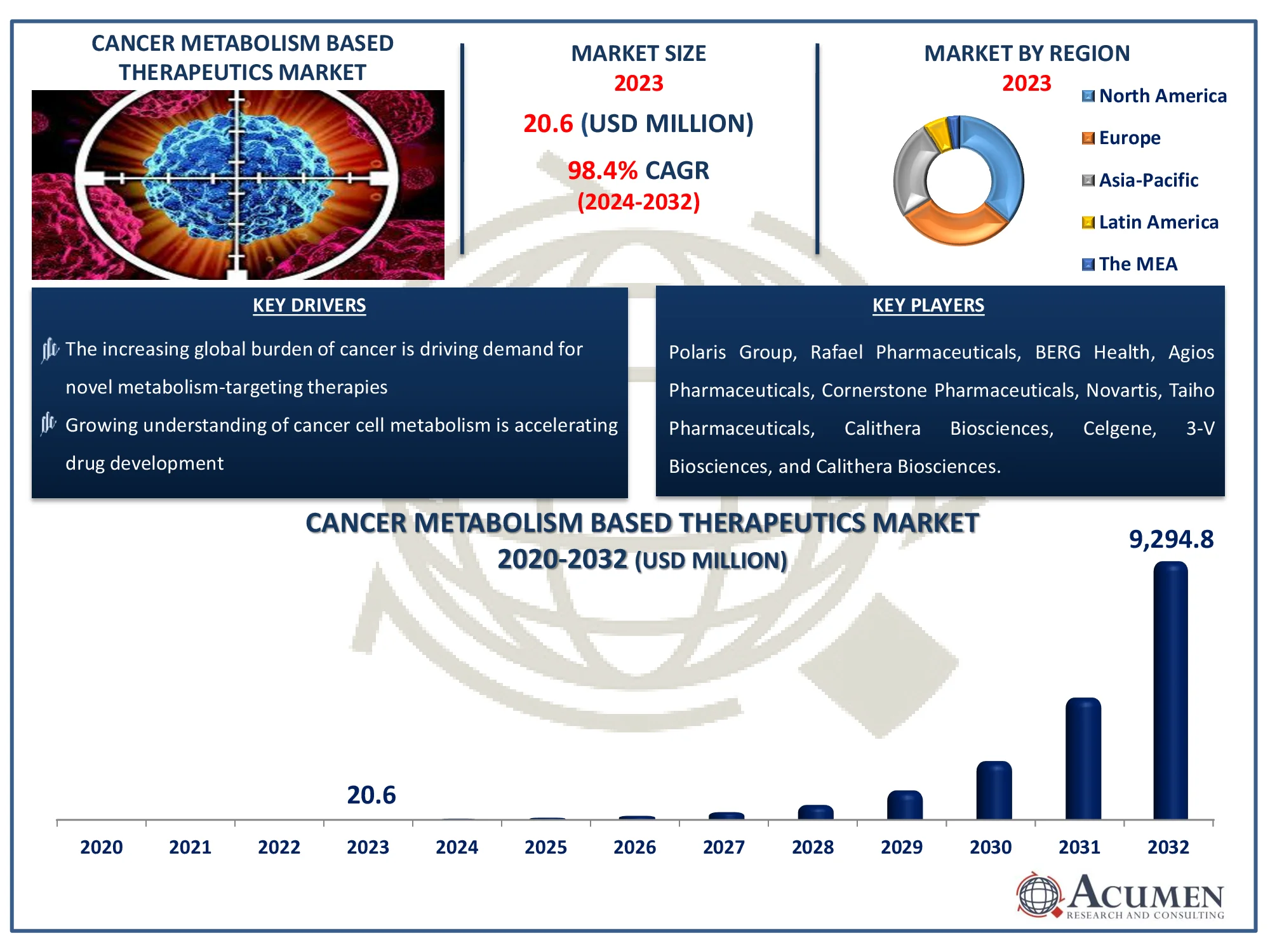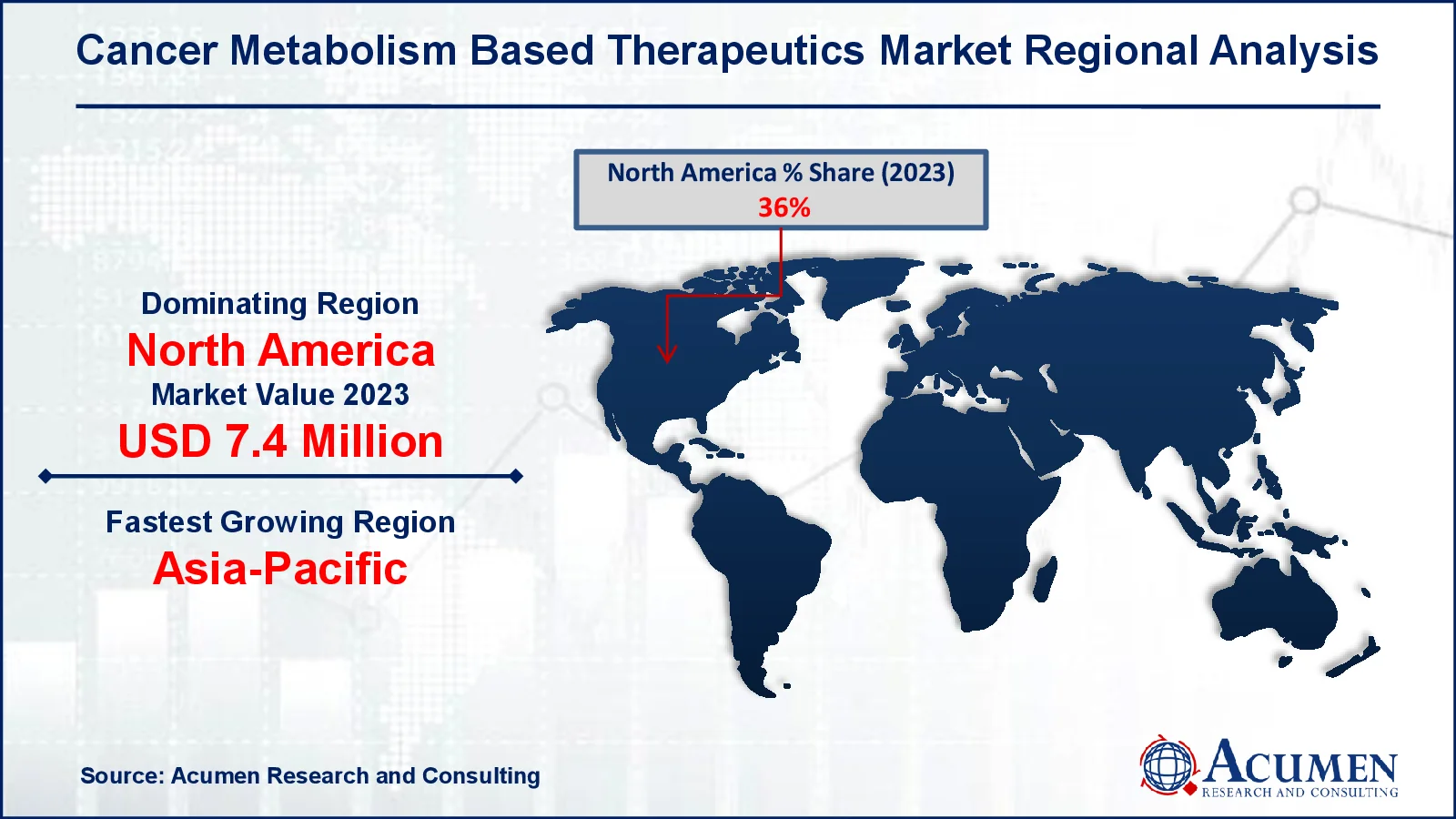September 2022
The Global Cancer Metabolism Based Therapeutics Market Size accounted for USD 20.6 Million in 2023 and is estimated to achieve a market size of USD 9,294.8 Million by 2032 growing at a CAGR of 98.4% from 2024 to 2032.
The Global Cancer Metabolism Based Therapeutics Market Size accounted for USD 20.6 Million in 2023 and is estimated to achieve a market size of USD 9,294.8 Million by 2032 growing at a CAGR of 98.4% from 2024 to 2032.

Cancer metabolism refers to the differences in cellular metabolism pathways found in cancer cells vs normal tissue cells. Therapeutic in medicine refers to the art and science of healing, as well as the branch that deals with the treatment of certain diseases. Therapeutics, thus, refers to the method of administration in the treatment of sickness and the usage of pharmaceuticals. According to Otto Warburg's findings in the middle of the twentieth century, metabolic activity in malignant tissue increases the quantity of lactate produced (from glucose) tenfold under aerobic conditions. This discovery sparked widespread interest, prompting industry stakeholders to focus on metabolic pathways in search of cancer-curing elements.
Cancer metabolism is based on cancer cells, which modify the metabolism of glutamine and glucose for nucleotides, as well as the synthesis of lipids, proteins, and fatty acids, all of which contribute to cancer cell proliferation. It inhibits a variety of metabolic pathways, including mitochondrial respiration, glucose and glutamine consumption, and the citric acid cycle. Because of the complexity of these metabolic pathways, progress in this field has been slow.
|
Market |
Cancer Metabolism Based Therapeutics Market |
|
Cancer Metabolism Based Therapeutics Market Size 2023 |
USD 20.6 Million |
|
Cancer Metabolism Based Therapeutics Market Forecast 2032 |
USD 9,294.8 Million |
|
Cancer Metabolism Based Therapeutics Market CAGR During 2024 - 2032 |
98.4% |
|
Cancer Metabolism Based Therapeutics Market Analysis Period |
2020 - 2032 |
|
Cancer Metabolism Based Therapeutics Market Base Year |
2023 |
|
Cancer Metabolism Based Therapeutics Market Forecast Data |
2024 - 2032 |
|
Segments Covered |
By Drug, By Therapy, By Indication, and By Geography |
|
Regional Scope |
North America, Europe, Asia Pacific, Latin America, and Middle East & Africa |
|
Key Companies Profiled |
Polaris Group, Rafael Pharmaceuticals, BERG Health, Agios Pharmaceuticals, AstraZeneca, Cornerstone Pharmaceuticals, Novartis, Taiho Pharmaceuticals, Calithera Biosciences, Celgene, 3-V Biosciences, and Calithera Biosciences. |
|
Report Coverage |
Market Trends, Drivers, Restraints, Competitive Analysis, Player Profiling, Covid-19 Analysis, Regulation Analysis |
The primary focus is on medications that cause metabolic pathways in cancer cells by blocking or modifying the activity of key enzymes involved in lactate metabolism, pentose phosphate pathway, lipid metabolism, amino acid metabolism, nucleotide metabolism, and TCA cycle. The rising incidence of cancer, the advancement of medicines, and the commercialization of biosimilars are just a few of the drivers driving the worldwide cancer pharmaceuticals market.
Furthermore, it comprises unique products that are being precisely created to target blocking metabolic pathways and key enzymes involved in cancer cell metabolism, which is propelling the market. Because of the high expense of new medication development, along with the risk of bad effects associated with cancer therapeutic therapies, failure would halt market expansion. Targeting cancer metabolism provides a chance to develop novel medications to treat a variety of cancer types. In addition, rising cancer occurrences are likely to fuel the expansion of the cancer metabolism based therapeutics market.
 Cancer Metabolism Based Therapeutics Market Segmentation
Cancer Metabolism Based Therapeutics Market SegmentationThe worldwide market for cancer metabolism based therapeutics is split based on drug, therapy, indication, and geography.
According to cancer metabolism based therapeutics industry analysis, the CPI-613 segment is expected to be the largest in the market. Rafael Pharmaceuticals produced CPI-613, a promising anti-cancer drug that targets abnormal mitochondrial metabolism in cancer cells. It is particularly engineered to disrupt important metabolic pathways, resulting in the selective death of cancer cells while sparing healthy ones. One of the main reasons for its dominance is its clinical success, especially in the treatment of hematologic malignancies such as acute myeloid leukemia (AML) and pancreatic cancer. CPI-613 has showed potential efficacy in combination therapy, boosting its adoption. Furthermore, the rising incidence of difficult-to-treat cancers, as well as increased interest in metabolic inhibitors as a therapy option, contribute to CPI-613's sizable market share.
The targeted drug segment of the cancer metabolism based therapeutics market is expected to increase significantly. This is because cancer cells have different metabolic features than healthy cells, a condition known as metabolic reprogramming. These changes provide cancer cells with the energy and building blocks they require for rapid multiplication and survival. Targeted therapies exploit these metabolic vulnerabilities by selectively interfering with the altered metabolic pathways essential for cancer growth. Unlike conventional chemotherapy, which frequently affects both healthy and malignant cells, targeted medications are designed to interact with cancer-specific metabolic targets. This approach has the potential to improve efficacy and reduce side effects, increasing demand for tailored medications.
Acute myeloid leukemia (AML) now leads the market. AML is a rapidly progressive blood and bone marrow malignancy characterized by aberrant immature cell proliferation. This aggressive nature needs effective treatment options, and cancer metabolism-based treatments hold tremendous promise in this field. AML cells typically have particular metabolic requirements as compared to normal blood cells, making them vulnerable to treatments that target these specific metabolic pathways.
AML's huge market share can be attributed to a variety of causes. The disease's aggressiveness and dismal prognosis drive the search for innovative therapeutics. Furthermore, ongoing research has identified major metabolic vulnerabilities in AML cells, allowing for the development of customized therapies that disrupt these pathways. The prevalence of clinical research looking at the efficacy of metabolism-based therapies in AML adds to the segment's importance. As these drugs progress through clinical studies and finally receive regulatory approval, the AML segment is expected to retain a large market share.
North America
Europe
Asia-Pacific
Latin America
The Middle East & Africa
 Cancer Metabolism Based Therapeutics Market Regional Analysis
Cancer Metabolism Based Therapeutics Market Regional AnalysisNorth America dominates the cancer metabolism-based treatments market due to its strong healthcare infrastructure, large R&D investment, and the presence of major biopharmaceutical businesses. The United States leads the region in both cancer incidence and sophisticated drug research. The rising emphasis on personalized therapy, as well as the increasing use of targeted pharmaceuticals, all contributes to market growth. Furthermore, government funding for projects such as the Cancer Moonshot program encourages research into new metabolic inhibitors.
The Asia-Pacific region is expected to witness the fastest growth over the cancer metabolism based therapeutics market forecast period due to rising cancer cases, increasing healthcare expenditure, and growing awareness of targeted therapies. Countries such as China, Japan, and India are making significant investments in cancer research and drug development. The increase of clinical trials and government-sponsored oncology programs improves market prospects. Furthermore, the emergence of contract research organizations (CROs) offers cost-effective methods for drug discovery and development.
Some of the top cancer metabolism based therapeutics companies offered in our report includes Polaris Group, Rafael Pharmaceuticals, BERG Health, Agios Pharmaceuticals, AstraZeneca, Cornerstone Pharmaceuticals, Novartis, Taiho Pharmaceuticals, Calithera Biosciences, Celgene, 3-V Biosciences, and Calithera Biosciences.
Looking for discounts, bulk pricing, or custom solutions? Contact us today at sales@acumenresearchandconsulting.com
September 2022
April 2021
January 2024
July 2024